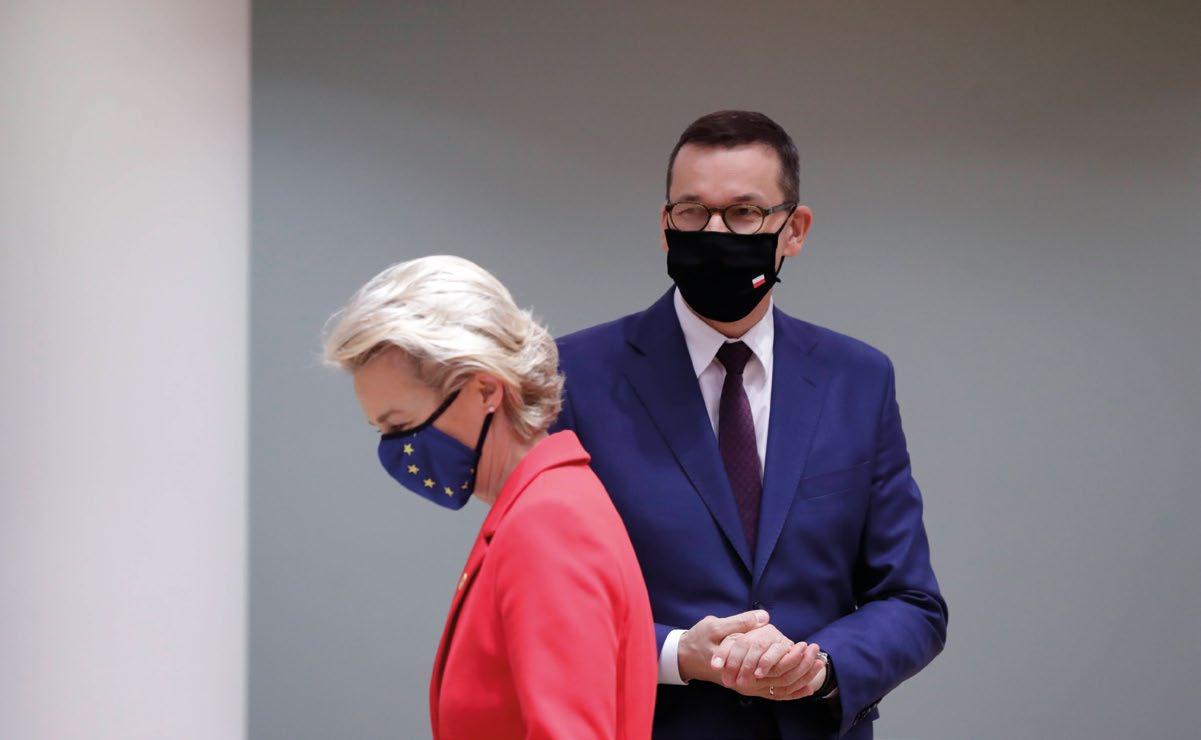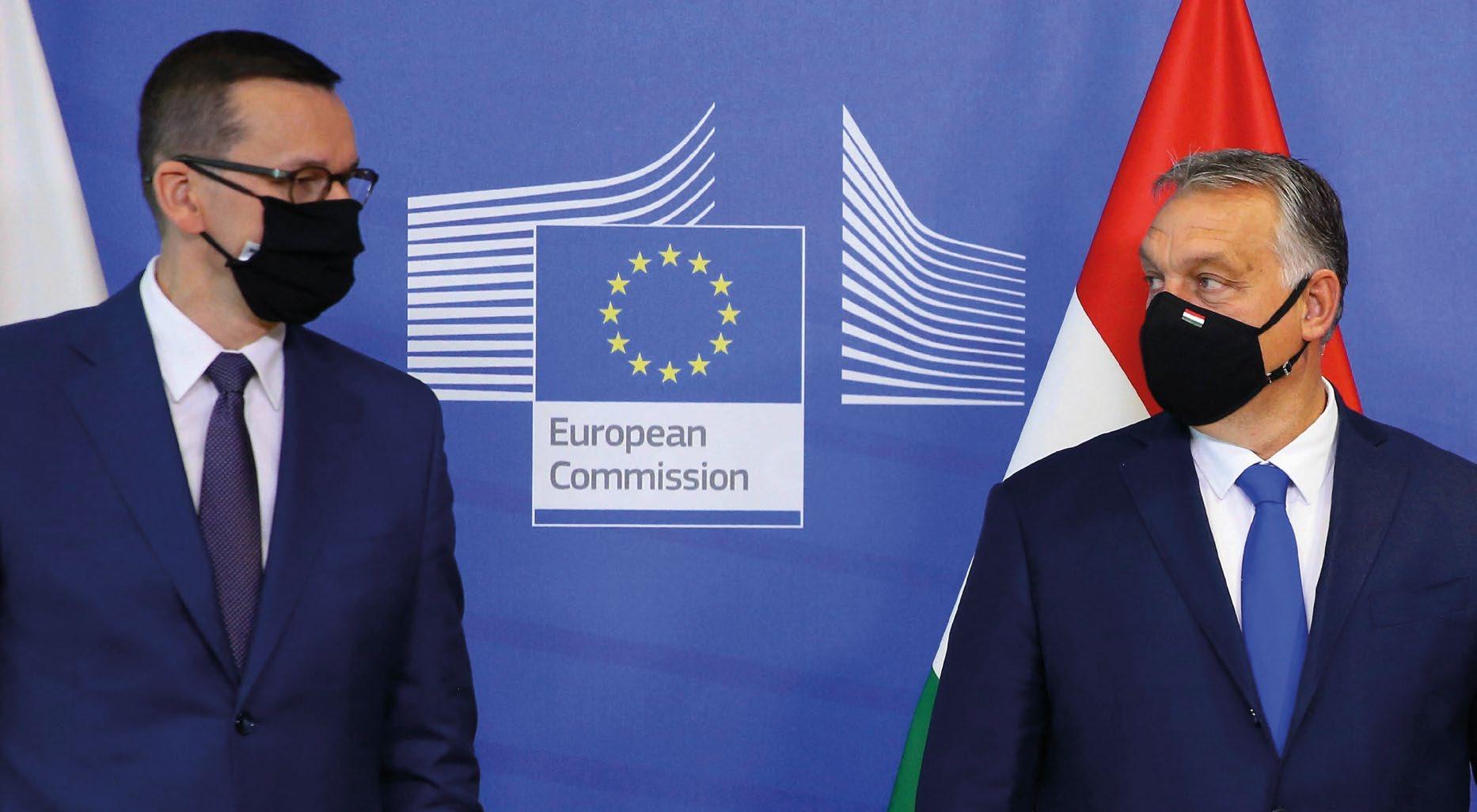
5 minute read
Polish Veto in the EU?
Jan Truszczyński, former long-time ambassador of Poland to the European Union, talks to Witold Żygulski.
I
have been a journalist for 37 years and I never thought I would ever ask someone such a question: Has Poland gone to war with the European Union?
I wouldn’t go so far as to make military comparisons, but things are not going well. The current situation is a result of the internal conflict of the ruling party [Law and Justice, PiS], and it is also partly due to their desire to extract some concessions from the others in the European Union, which could be sold as a success in their own camp.
I believe that even now, despite the increasing instability of the government, we are not witnessing a reckless Polish “charge of the uhlans.” I hope that Polish negotiators have at least some idea on what could be realistically obtained by taking such a drastic stance [i.e. a possible veto on the EU budget for 2021-2027]. I assume that all the costs regarding Poland’s relations with other EU countries have been included in the equation, including those image-related and long-term ones. All in all, I would hope that if we are dealing with an attempt at a strategic approach to European affairs, there is a way out of this conflict without a suicidal solution, i.e. the real announcement of the [prime minister’s] suggested veto on the EU budget and blocking of EU financial instruments. Of course, I could be wrong, but it seems (and I hope) that the team around Mateusz Morawiecki can see the consequences of such a step. Otherwise, surely they wouldn’t charge so stupidly...
I am happy to see your optimism...
It is not optimism, but hope. Since [Hungarian leader Viktor] Orban and Polish PM Mateusz Morawiecki have gotten themselves into this cul-de-sac, they have to figure out themselves how to get out, while insisting that their gambit paid off. Hopefully readiness to talk plus concrete suggestions are already presented to the current German presidency of the EU. Various options are apparently under consideration. For instance, an idea that Poland and Hungary would appeal against the “rule of law and funds” regulation to the Court of Justice of the European Union, while the European Commission would declare that while such a complaint was
Jan Truszczyński
being considered, it would wait for a verdict without taking legal steps; a weak idea, because how can any EU actor lawfully claim he is not temporarily bound by the law which is formally in force across the entire Union?
Another scenario is an interpretative declaration that can be proposed by the European Commission, at the level of the College of Commissioners or only by the commissioner responsible for budget implementation. But would this be a face-saving fig leaf for Poland and Hungary? I doubt it.
Mateusz Morawiecki and Ursula von der Leyen,
President of the European Commision, Photo PAP

Let’s talk about the worst-case scenario: What will happen if the Polish budget veto becomes a fact?
If Poland’s and Hungary’s stonewalling continues, we will face a situation where the EU’s financial instruments, its multiannual budget and, it should be stressed, recovery fund, i.e. funds for combating the consequences of the COVID-19 pandemic, come under very serious threat. This would be a precedent: There are no tools for resolving a situation when there is no unanimity in the Council of the EU. As to the EU long-term budget and the 2021 annual budget, obviously we would have instead a provisional regime of twelve monthly appropriations (installments). How long would it last? No one knows. And, moreover, it would be a painful hit for every member state. Regarding possible alternatives to the current recovery fund, one way to go about it might be the enhanced cooperation between some Member States on the basis of Article 326 of the European Treaties. Another possible option could be a fund set up under an intergovernmental agreement, just like the European Stability Mechanism established in 2012, or the Schengen agreement of 1985. It is clear that alternatives to the recovery fund are thinkable and doable; the question is: would Poland or Hungary participate in them?
Some politicians, especially the ruling camp, play down the Warsaw-Brussels crisis today by saying that a possible provisional budget could be an even better financial solution for Poland than the standard EU budget. How do you comment on this?
All the people speaking out about this obviously have too little information. The EU has not had provisional budgets for a very long time, practically since the mid-1980s. So we are talking about a terra incognita. Adjusting IT and accounting systems would not be a problem. But multiannual financial framework and standard annual budgets are is very different from financing by a regime of provisional twelfths. Ongoing projects would be funded, but the 40-odd spending programmes under the new long-term budget could not be launched – so zero new projects, no new commitments for research and innovation, for healthcare cooperation, for students going on Erasmus, and so on. Huge problems, which could however be lifted in a split second, all we need is green light from Poland and Hungary.
Does the current dispute over the budget and the rule of law mean that we have earned ourselves the reputation of a troublemaker in the EU?
Those ruling Poland have certainly been working hard to earn the status of a quarrelsome and unrepentant marginalized outlier. The country’s international reputation is in shambles and this outcome is entirely attributed to the efforts of the ruling PiS team. They continue to dig deeper the hole in which they find themselves and into which they have dragged Poland. Unfortunately, the negative stereotype view of today’s Poland in other other EU capitals will take a long time and a lot of effort to overcome.
Mateusz Morawiecki with Victor Orban, Photo PAP











